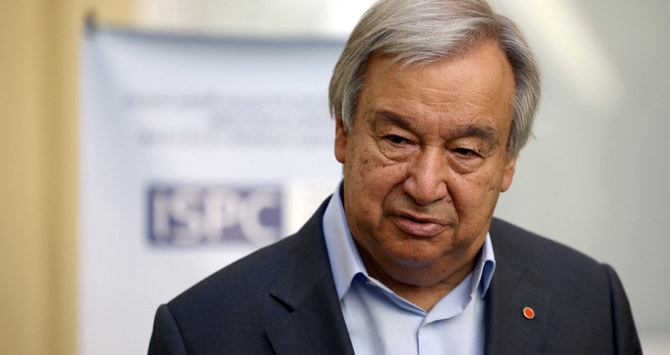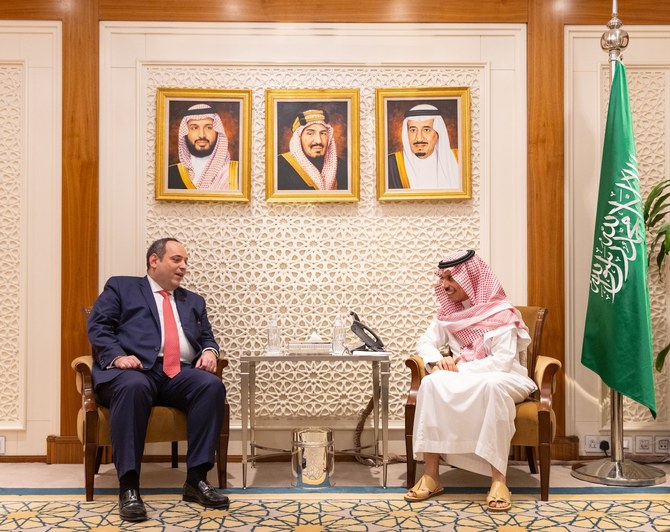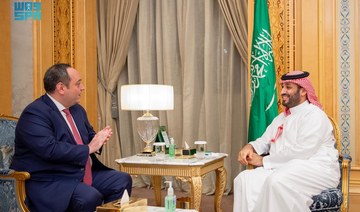NEW YORK: UN Secretary-General Antonio Guterres on Wednesday expressed hope that talks underway between authorities in Saudi Arabia and Iran will help to ease tensions in the Gulf region.
“I hope that the dialogue that started between Saudi Arabia and Iran, and other forms of dialogue in the region, will produce results and will allow a reduction of the tension in the Gulf,” he told Arab News.
It came as he reflected on the role the Kingdom, the UAE other Gulf nations can play in tackling global crises — including food insecurity, climate-related emergencies and energy shortages — and regional conflicts such as those in Syria, Yemen, Libya and between the Israelis and Palestinians.
“I am sure that (Saudi Arabia, the UAE and the entire Gulf Cooperation Council) will be quite active in relation to the promotion of peaceful solutions in their neighborhood: In Syria, Libya, Yemen or in any other country that is close to them,” said Guterres.
“I think the people of Syria, the people of Libya, the people of Yemen have already suffered too much. And my appeal is for everybody to come together to solve those problems.”
The UN chief also said he hopes that “GCC countries, which have a huge capacity for production, will contribute to (resolving) the energy crisis in the world.”
Turning to the latest developments in Libya, Guterres said that the supposed ceasefire there “is not in sight.”
He added: “It’s difficult to know what is the biggest challenge that requires action. We must preserve peace between (the rival authorities in the) east and west but that also means preserving peace in relation to the recent confrontations that happened in Tripoli.
“With the militias supporting either (Government of National Unity Prime Minister Abdul Hamid) Dbeibah or (Government of National Stability leader Fathi) Bashaga, we need hostilities (to stop.) That is fundamental.”
Guterres said that legitimacy remains a problem in Libya and he called for a quick agreement between the House of Representatives in the east of the country and the High Council of State that would allow the implementation of legal changes required for national elections to take place.
He urged external actors involved in Libya to “fully support the process of reconciliation” and back the political process that could lead to the election of a “legitimate government that everybody accepts.”
Speaking on Wednesday during a news conference to mark the start of the 77th Session of the UN General Assembly the previous day, Guterres, who had just returned from a visit to flood-ravaged Pakistan, prefaced his remarks with a striking message denouncing the “sheer inadequacy of the global response to the climate crisis” and urging the international community to take more-aggressive action to mitigate its effects.
Describing the ongoing “climate carnage” in Pakistan, which has so far resulted in the deaths of more than 1,300 people and caused damages estimated at more than $30 billion, Guterres said his trip to the stricken country was a “window into the future.”
He added: “A future of permanent and ubiquitous climate chaos on an unimaginable scale: Devastating loss of life, enormous human suffering, and massive damage to infrastructure and livelihoods.
“What is happening in Pakistan demonstrates the sheer inadequacy of the global response to the climate crisis, and the betrayal and injustice at the heart of it. It is simply heartbreaking.
“No picture can convey the scope of this catastrophe. The flooded area is three times the size of my entire country, Portugal.”
Guterres once again pointed out that although the greenhouse-gas emissions that cause the planet to heat up and its glaciers to melt are overwhelmingly produced by the world’s richest nations, it is poorer countries such as Pakistan that bear the brunt of resultant extreme-weather events and the death and destruction they bring.
“Whether it’s Pakistan, the Horn of Africa, the Sahel, small islands or the least-developed countries, the world’s most vulnerable — who did nothing to cause this crisis — are paying a horrific price for decades of intransigence by big emitters,” he said.
“G20 countries are responsible for 80 percent of emissions. If one-third of G20 countries was underwater today, as it could be tomorrow, perhaps they would find it easier to agree on drastic cuts to emissions.”
He warned that continued inaction now will cause occurrences of devastating weather events to multiply in the future. The repercussions, including instability and global mass migration, will be felt “for years to come,” he added
“My message to world leaders gathering here is clear: Lower the temperature — now. Don’t flood the world today; don’t drown it tomorrow,” said Guterres.
Geopolitical divides have never been so extreme, he added, and are paralyzing efforts to address global challenges.
“Our world is blighted by war, battered by climate chaos, scarred by hate and shamed by poverty, hunger and inequality,” Guterres said.
The human solidarity enshrined in the words of the UN charter is “being devoured by the acids of nationalism and self-interest, shocking disregard for the poorest and most vulnerable in our world, (and) by politicians who play to people’s worst instincts, for partisan gain.”
He concluded by reiterating the importance of offering hope to people.
“This year’s general debate must be about providing hope and overcoming the divisions that are dramatically impacting the world,” Guterres said.
“That hope can only come through the dialogue and debate that are the beating heart of the United Nations and that must prevail … against all divisions.”
UN chief expresses hope that Saudi-Iranian talks will help ease regional tensions
https://arab.news/zkmya
UN chief expresses hope that Saudi-Iranian talks will help ease regional tensions

- Secretary-General Antonio Guterres told Arab News he is certain the Kingdom, the UAE and other Gulf nations have an active role to play in promoting peace in Syria, Yemen and Libya
- The ‘climate carnage’ in Pakistan shows that the global response to the climate crisis is inadequate, he said, and demonstrates the ‘betrayal and injustice’ that lies at the heart of it
Saudi Justice Ministry to host training conference

RIYADH: The Saudi Ministry of Justice is to hold the International Conference of Judicial Training in Riyadh from May 6-7.
The Judicial Training Center hosts the event which will see the participation of several international training institutes, centers, and experts in the field of judicial and legal training. The objective is to facilitate the exchange of experiences and deliberations on contemporary trends in the era of digital transformation.
Called “The Future of Judicial Training in the Era of Digital Transformation,” the event will delve into the prospects of training in the future. It will explore paths for enhancing training content; strategies for harnessing modern technology; artificial intelligence in judicial training; and effective methodologies for measuring the training’s impact.
Saudi energy minister attends Tashkent International Investment Forum

TASHKENT: Saudi Minister of Energy Prince Abdulaziz bin Salman on Thursday participated in the primary dialogue session at the third Tashkent International Investment Forum.
In the presence of the president of Uzbekistan Shavkat Mirziyoyev, the energy minister highlighted the distinguished relations between the two nations, emphasizing the leadership’s strong commitment to enhancing and expanding cooperation across all sectors, particularly energy.
The partnership aims to benefit both countries and their citizens.
Who’s Who: Ali Alhasan, CEO and founder of NanoPalm

- Alhasan co-developed deep tech to leverage large language models for biotech discovery
- He was granted the Outstanding Researcher Award from the International Institute for Nanotechnology in 2012
Ali Alhasan is CEO and founder of the company NanoPalm. He holds a Ph.D. in nanomedicine, with expertise in nano-drug delivery and gene therapy and five years of experience in executive management.
In his role as CEO, Alhasan formulates the strategic and business plans for accelerating therapy translation globally and trains talents in deep tech, nanotech, and gene editing tech.
Alhasan co-developed deep tech to leverage large language models for biotech discovery. He also co-invented Nanopalm’s biorobots for the delivery of gene editing primers and helped discover four nanomedicines for four different genetic diseases.
He is also an associate professor at King Abdulaziz City for Science and Technology and an adjunct professor at Alfaisal University, establishing collaboration agreements between the two.
As associate professor, he is the principal researcher for development and innovation in nanomedicine and the fourth industrial revolution.
In his role as adjunct professor, Alhasan teaches nanomedicine and mentors postgraduate and undergraduate students. He also co-established the Cancer Nanoscience Program.
Previously, Alhasan served in executive leadership roles at KACST as deputy at the Joint Centers of Excellence Program (2021), deputy of the Life Science and Environment Research Institute (2020), director of the Center of Excellence for Biomedicine (2020), and director of Strategic Initiatives (2016).
Alhasan was a post-doctoral scholar at the University of California in 2015 and received his Ph.D. in the Interdepartmental Biological Sciences Program from Northwestern University in 2013.
In 2008, he received a master’s degree in biotechnology also from Northwestern University, while in 2001, he received his bachelor’s degree in medical technology from King Abdulaziz University.
Alhasan was granted the Leader of the Year award from the Ministry of Communication and Information Technology in 2024. In 2018, he received the Outstanding Investigator Award from KACST.
He was granted the Outstanding Researcher Award from the International Institute for Nanotechnology in 2012.
Prince Faisal bin Farhan speaks with Swiss foreign minister

- two ministers discussed developments of common interest and efforts made by both countries in those areas
RIYADH: Saudi Foreign Minister Prince Faisal bin Farhan spoke on the phone with his Swiss counterpart Ignazio Cassis on Thursday.
During the call, the two ministers discussed developments of common interest and efforts made by both countries in those areas, Saudi Press Agency reported.
Cassis was in the Kingdom last month to attend the Special Meeting of the World Economic Forum held in Riyadh on April 28 and 29, during which he met with Prince Faisal.
Prince Faisal and Cassis also met earlier in the year in February during UN meetings in Geneva.
Saudi FM discusses preparations for Expo 2030 with BIE chief

- During the meeting, the two officials discussed the Kingdom’s preparations to host Expo 2030 in Riyadh
- “We underlined the importance of careful planning to deliver a transformational World Expo in 2030,” Kerkentzes said
RIYADH: Saudi Foreign Minister Prince Faisal bin Farhan received the Secretary-General of the Bureau International des Expositions Dimitri Kerkentzes in Riyadh on Thursday.
During the meeting, the two officials discussed the Kingdom’s preparations to host Expo 2030 in Riyadh and coordination to ensure that the exhibition would be “exceptional,” Saudi Press Agency reported.
Writing on social media platform X, Kerkentzes said: “We underlined the importance of careful planning to deliver a transformational World Expo in 2030.”
The BIE chief met with Crown Prince Mohammed bin Salman on Wednesday.
World Expo 2030 will be hosted in Riyadh after the Kingdom defeated challenges from South Korea and Italy to host the prestigious event in November 2023.


















